#1999 MTV Movie Awards
Explore tagged Tumblr posts
Text

Catherine Zeta-Jones | Emanuel Ungaro dress | MTV Movie Awards | 1999
9 notes
·
View notes
Text

There's Something About Mary (1998, Farrelly Brothers)
24/11/2023
There's Something About Mary is a 1998 film directed by brothers Peter and Bobby Farrelly.
The film marked a turning point in both the careers of the directors and that of the two protagonists: in the United States it increased their popularity, while in the remaining countries it made them known to the general public. Various famous people took part in simple cameos; among them the American football player Brett Favre, the actor Richard Jenkins and the comedian Harland Williams.
The film was released in the United States on July 15, 1998, and in Italy on October 16 of the same year. It won numerous awards - including four MTV Movie Awards and three Teen Choice Awards - and received two Golden Globe nominations in 2000. Furthermore, the American Film Institute placed it twenty-seventh in its list of the best one hundred American comedies of all time. The film grossed almost 370 million dollars worldwide and proved to be both a commercial and critical success, which particularly appreciated the political i correctness constantly present in the film.
In 1985, sixteen-year-old student Ted Stroehmann falls in love with Mary Jensen, a beautiful girl who attends the same high school as him; he manages to impress her when he defends from a bully Warren, the brother of the young girl who is mentally retarded. Shortly thereafter Mary moved to Miami and Ted never had the opportunity to see her again.
In 1998, the now twenty-nine-year-old Ted, a sports writer by profession, continues to undergo various psychoanalysis sessions to try to forget the girl, but with poor results. To make Ted give up, investigator Healy finally tells numerous lies by stating that Mary - although she is not married - has four children, she has gained weight, become disabled and has also left for Japan.
According the co-director and co-writer Bobby Farrelly, the film:
"It's a cross between When Harry Met Sally... And Blazing Saddles."
The spec script of the film was finished in 1998, however it was not used until 1997. In that year Frank Beddor - a friend of the two screenwriters who wanted to become a film producer - was struck by the work and managed to bring it to the attention of the president of 20th Century Fox, Thomas Rothman.
Although the Farrellys were well known in the cinema world after the success of their first film, Dumb and Dumber, they initially thought that There's Something About Mary would be their last work; Kingpin, the project they had previously dedicated themselves to, had in fact proved to be a commercial failure for which thay had not even recovered the production costs.
The photography and editing of the film were entrusted respectively to Mark Irwin and Christopher Greenbury, roles they had also held in previous films directed by the Farrellys. Actor and co-star Matt Dillon praised the Farrellys for the characterization of the characters and the dialogue between them, also appreciating "their very distinctive filmmaking style and the fact that in each of their films there is a truly memorable group of characters".
Bobby and Peter Farrelly were aware that "there had been no R-rated comedies for a long time" and that studios were more inclined to finance films classified as PG-13, i.e. those whose viewing was permitted from thirteen years of age; the directors also added that in the period in which they filmed There's Something About Mary, the normality was given by comedies such as Doctor Dolittle, from which they however wanted to deviate.
#There's Something About Mary#film#1998#farrelly brothers#united states#brett favre#richard jenkins#Harland Williams#italy#1999 MTV Movie Awards#1999 Teen Choice Awards#Nomination#57th Golden Globe Awards#american film institute#AFI's 100 Years 100 Laughs#dollar#film criticism#1985#miami#japan#when harry met sally#blazing saddles#Spec script#20th century studios#dumb and dumber#kingpin#mark irwin#Christopher Greenbury#matt dillon#Motion picture content rating system
1 note
·
View note
Text


Catherine Zeta-Jones at MTV Movie Awards (1999)
51 notes
·
View notes
Text
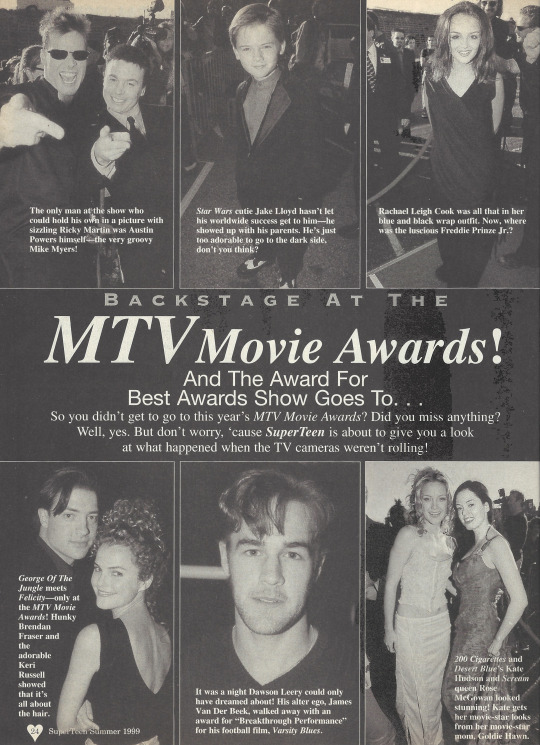
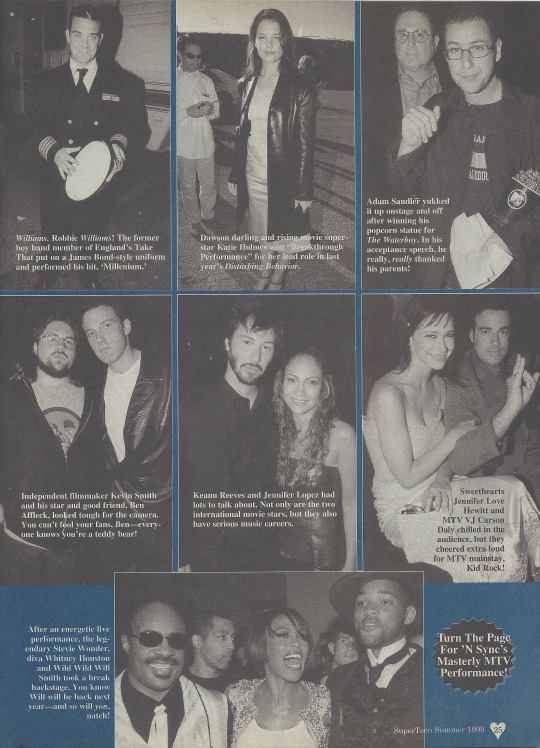
From SuperTeen, Summer 1999.
#superteen#teen magazine#1999#1990s#mtv movie awards#ricky martin#mike myers#rachel leigh cook#brendan fraser#keri russell#james van der beek#robbie williams#adam sandler#jennifer lopez#keanu reeves#ben affleck#whitney houston#stevie wonder#will smith#jennifer love hewitt#carson daly#kevin smith
37 notes
·
View notes
Text
youtube
Wes Anderson Re-Creates The Truman Show, Armageddon & Out of Sight as Stage Plays Performed by the Cast of Rushmore (1999) | Open Culture
2 notes
·
View notes
Text
ben affleck and "matt damon" at the 1999 MTV movie awards
#the kiss has me giggling#i wish i was ben#kevin had to take a moment 😭😂#kevin's fit is so gender#kevin smith#ben affleck#dogma 1999#view askewniverse
78 notes
·
View notes
Text

hole at the mtv movie awards, 1999
#courtney love#hole#hole band#grunge#women in rock#celebrity skin#live through this#nobodys daughter#pretty on the inside#music#rock#rock music#alternative rock#grunge music#90s music#90s#1990s#courtney love cobain#kinderwhore#america’s sweetheart
62 notes
·
View notes
Text
Ned Beatty

Physique: Average/Stocky Build Height: 5'8 " (1.73 m)
Ned Thomas Beatty (July 6, 1937 – June 13, 2021; aged 83) was an American actor who appeared in over 160 films. Throughout his career, Beatty gained a reputation for being "the busiest actor in Hollywood". His film appearances included Deliverance, White Lightning, Network, Superman, Superman II, Back to School, Rudy, Shooter, Toy Story 3, and Rango. He also was a series regular on the first three seasons of the hit NBC TV drama Homicide: Life on the Street. Beatty was nominated for an Academy Award, two Emmy Awards, an MTV Movie Award for Best Villain, and a Golden Globe Award; he also won a Drama Desk Award.





Stocky, genial looking, Beatty is most remembered and lusted after as one of the four main stars in the backwoods thriller Deliverance. Forever immortalized in the notorious 'squeal like a pig' rape scene. I wonder how many wanted his ass, and then how many wanted the roles to be reversed?


Born in Louisville, Kentucky, Beatty graduated from Eastern High School and subsequently received a scholarship to sing in the a cappella choir at Transylvania University in Lexington, Kentucky, without graduating, then spent his early career performing with regional theatre companies. For eight years, he was a resident player at the Arena Stage in Washington. After "Deliverance" (1972) introduced him to American film audiences, Beatty quickly became one of Hollywood's most rock-steady supporting everymen.





Beatty was married four times. He and his first wife were married from 1959 until 1968 and had four children. In 1971 he married his second wife with whom he had two children. He married his third wife in 1979 and with her he had more two children. He married his fourth wife in 1999 until his on June 13, 2021 of natural causes, at the age of 83.

RECOMMENDATIONS: Shooter (2007) Superman (1978) Network (1976) Deliverance (1972)
68 notes
·
View notes
Text


Kate Hudson at the 1999 MTV Movie Awards
#Kate Hudson#mtv movie awards#1990s#90s movies#almost famous#how to lose a guy in 10 days#90s fashion#90s aesthetic#y2k
24 notes
·
View notes
Text
A guide to Robin Finck in Guns n' Roses for people who can't stand Axl Rose
I've spent months reading, watching and listening to all things regarding Robin's time in Guns so you don't have to.
*extremely long post*
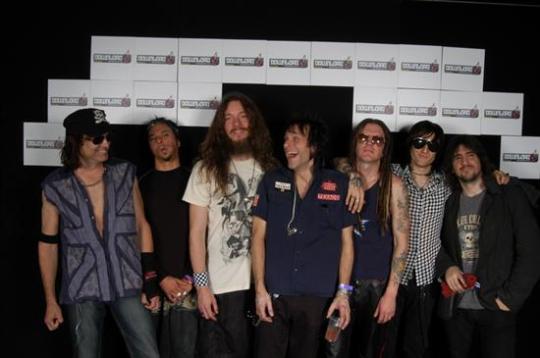
L to R: Chris Pitman, Bryan "Brain" Mantia, Robin Finck, Tommy Stinson, Dizzy Reed, Richard Fortus and Ron "Bumblefoot" Thal. At Download Festival, June 11, 2006.
From Cirque to Guns
In the beginning of 1997 Cirque du Soleil was touring Los Angeles and Axl Rose went to see the show. Matt Sorum (GnR's drummer until then) pointed out to Axl that 'Robin from Nine Inch Nails' was playing the guitar.
"I told Axl to see him and he said, 'That's our guitar player,' I said, 'Bring in Robin to play alongside Slash', but Axl said, 'I want him to play lead.'" - Matt Sorum, 1999.
Robin got a call from Axl and then he started to jam with the band (already without Slash) every Monday, his day off (circus' dark day). In April, Chris Vrenna also joined for a few sessions before he split to focus on his Tweaker project, and Robin brought Billy Howerdel (former guitar technician for NIN) to help him program his sounds, but wound up staying for two and a half years with them.
In June, Robin quit the circus and joined the band.
2 years contract (August 1997 to August 1999)
Over the year of 1998, the band took shape, consisting of Robin and Paul Huge Tobias on the guitar, Tommy Stinson on bass guitar, Dizzy Reed on keys and percussion, Josh Freese on drums and Chris Pitman helping them with writing and engineering. Although Axl was contributing with ideas, he wasn't laying many vocal tracks at that time, as he was allegedly suffering with writer's block.
They wrote at least half of the Chinese Democracy album along with other still unreleased songs and many instrumentals in this period, including parts/ideas Robin had previously come up with during his circus days. Some sources had said they were working on 35 tracks.
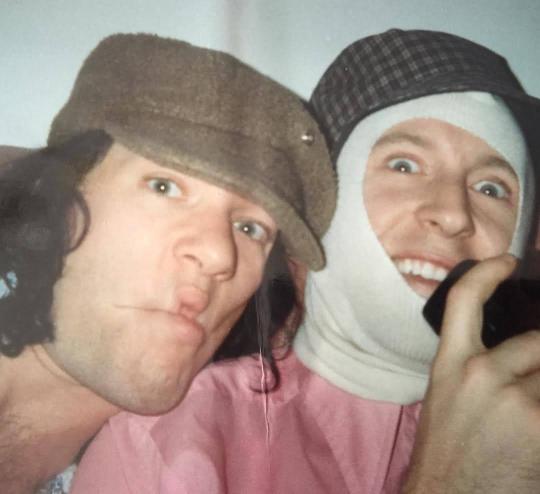
Robin and Josh Freese in 1998 (from Josh's Instagram)
They also re-recorded Appetite for Destruction, which was never released but a segment of Sweet Child o'Mine was included in the closing credits of 1999's Big Daddy movie. Axl's intention was to use the entire song, but Slash and Duff didn't allow it, so they made a hybrid of the old version with their new one. You can listen to their segment starting at 2'58, with the second part of the main solo and the last one played by Robin:
youtube
It was rumored that Robin recorded an uncredited overdub of backing vocals for the track Mr. Brownstone in the Live Era '87-'93 compilation album. You can listen to it below, around 1'25 min.
Just in time for NIN's Fragility tour v1.0, his contract came to an end in August and soon he went to Bahamas with Nine Inch Nails to begin with their tour rehearsals.
Atlas Shrugged
"I have respect for Axl Rose, I wish him all the success that he deserves and if his album sounds a little industrial, I will take it like a compliment... On the other hand, when we played MTV awards, he made pass a press release announcing that it would cut of his disc all the parts of guitars played by Robin Finck and I find that a little ridiculous, it is a whim of star." - Trent Reznor, 1999.
"And they just said, 'Come over and do some stuff.' It's a long story to be honest and I won't bore you with all the details, but Axl was feeling that he was in a difficult place because the guitarist that he'd been working with on this new album had sort of replaced Slash, because they fell out, sadly. [...] The guitarist that had done most of the tracks had departed and Axl had a real emotional attachment to what he'd done, and yet he didn't want him on the album - and I hope I'm not saying too much here - he didn't really want him to stay on the album because he'd disappeared, you know - so he's feeling a kind of divided loyalty and he said: 'Brian, can you come and do stuff which I WILL LIKE, (laughing) and I won't feel too bad about ditching this other stuff?'" - Brian May, 2000.
While Axl was trying to cut Robin's work out of Chinese Democracy, hiring high-profile guitarists such as Dave Navarro and Brian May to lay guitar tracks, he started recording vocals for some of the songs, like HardSchool (now Hard Skool), Catcher in The Rye and The Blues (now Street of Dreams). Among them, the still unreleased Atlas Shrugged has lyrics which are allegedly about Robin.

An excerpt from Atlas Shrugged lyrics.
Whether it's about him or not, the lyrics go along with feelings of "following his heart" Robin expressed through interviews from that time.
"It was a difficult decision to make because I was so wrapped up in what I was doing at the time and I was proud of the work I'd done. But when it came down to it, I couldn't imagine NIN going out without me or with somebody else. I'm in a good place right now." - Robin Finck, 1999.
Prior to quitting the band to form A Perfect Circle with Billy Howerdel, Josh Freese helped Axl getting in touch with Buckethead. In early 2000 Buckethead was convinced to join in.
3 guitars lineup
"Originally it was gonna be a two-guitar player group. I split forever so I thought and went back to Nine Inch Nails. In my absence they were looking to replace me and Josh Freese, the drummer at the time, had brought Buckethead in to essentially fill the slot I had left. They really liked him but he's kind of a stunt guitar player. He does a very specific thing and he has a real genius sensibility about him. But he rarely plays the same thing twice ever and when you're trying to cruise through 'Nightrain' that just makes it a little (laughs) too different. So they needed someone to anchor the songs. They kept Buckethead to do what Buckethead does and they needed someone else to play alongside." - Robin Finck, 2014.
In late 2000 Robin returned to Guns for the upcoming gig as headliner act of Rock in Rio III Festival. As a sort of warm-up show, the band was booked for a New Year's Eve gig at The House of Blues in Las Vegas. It was the first time Robin performed live with Guns n' Roses.
Robin and Buckethead playing Paradise City at The House of Blues, January 1st, 2001.
With two lead guitarists, rumors that Robin and Buckethead weren't getting along very well began to emerge. And it seems that Axl encouraged competition between them.
"So it's taken a long time to pull these guys together and then have them develop a chemistry with themselves. When we first did our first show in Vegas, Robin and Buckethead didn't know each other at all, and you've got two lead guitar players trying to kill each other. You know, with their abilities. It's like when I tried to bring Zakk and Slash together. That didn’t go too well. (...) It was fun to watch." - Axl Rose, 2002.
Although neither Robin or Buckethead talked about it, years later Tommy Stinson showed his disdain for Buckethead on interviews and soon-to-be a member Richard Fortus has talked extensively about how difficult it was to make a lineup with three guitarists work. I'll return to this topic later.
Skullet
For these shows, Robin appeared with an extreme form of the mullet hairstyle, the skullet. Differing from his previous tours with Nine Inch Nails, this time he maintained the same haircut for the whole touring cycle: from the few performances in 2001 until their last gig in 2002. The only difference is that he straightened his hair in 2002.
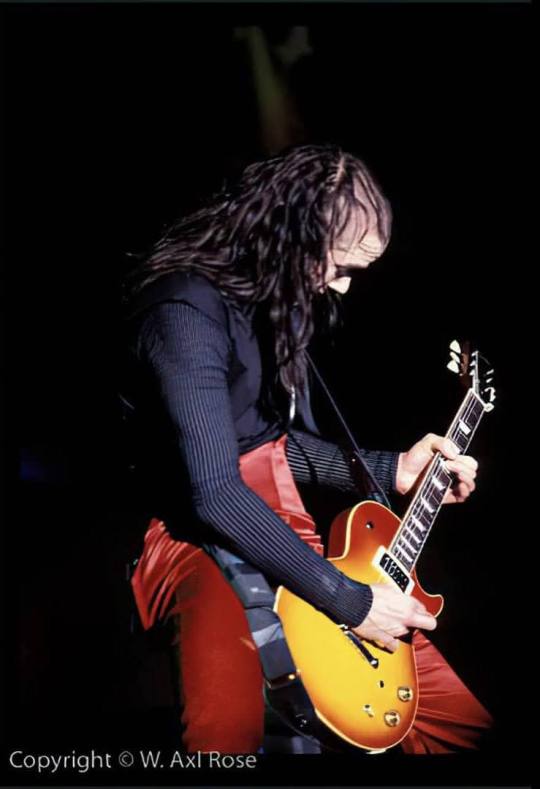
At The Joint, Las Vegas, December 31st, 2001. Photo by Robert John.
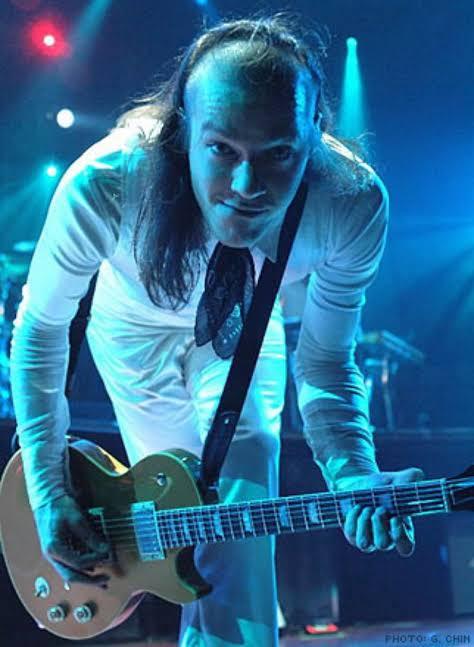
From their US leg of the tour, 2002. Photo by George Chin.
Better
Between his comeback and early 2001, Robin came up with a song working titled 3 Dollar Pyramid, which turned out to be Better, the only song released with credits attributed exclusively to him and Axl Rose.
"[Better] was brought in after Josh [Freese] and was written by the band. It was Robin Finck’s song. We jammed it for a couple weeks and then went into the studio and recorded it." - Bryan "Brain" Mantia (GnR's drummer from May 2000 until June 2006), 2009.
youtube
Better without vocals
Richard Fortus
In 1999 Richard auditioned for Robin's place. He wasn't the chosen one but became good friends with Tommy. When Paul Tobias stepped out of his role as rhythm guitarist, Tommy called Richard to replace him for the 2002 tour.
Soon Richard and Robin formed a strong bond, which could be seen on as much as offstage throughout Robin's tenure, with Richard stating several times how much he loved working with him afterwards.

Richard and Robin during Nightrain at Allstate Arena, Chicago, November 18th, 2002.
Refusing to leave
After the 2002 tour being cancelled halfway through and "Guns' inability to complete an album", Buckethead quit in late 2003. In spite of the uncertainty of their situation as a band, Robin preferred not to leave them this time to tour with Nine Inch Nails. According to Reznor, his choice was driven by greed.
"Robin Finck [was] getting paid loads of money to hang out with Axl Rose and his house was getting paid for. You know what, f*ck you." - Trent Reznor, 2005.
Robin has never touched on this subject, but there are two things that need to be stressed: The album was very close to be finished and Guns was planning to perform in late 2005 - which only became reality in 2006 - so his decision might have been because of it.
2 guitars lineup?
"As far as I know, he [Buckethead] hasn't been replaced, but we already have enough guitarists". - Tommy Stinson, 2004.
"At the moment, Robin Finck and I are the only guitarists in the band. We switch off between lead and rhythm." - Richard Fortus, 2005.
They kept rehearsing as a duo until a few weeks before their warm-up gigs for the European tour at the Hammerstein Ballroom in May 2006.
"It was just Robin and myself, and we were doing rehearsals and Brain, and it was phenomenal, I mean, absolutely amazing. And literally, I think it was two days before we were supposed to do our first show, the energy was palpable. [...] Axl came down, he was like, 'This is the band I've always wanted.' The next day Bumblefoot comes in, and I guess, they found this guy and he came in, and the whole dynamic just completely shifted." - Richard Fortus, 2020.
Bullying Ron "Bumblefoot" Thal
Tommy had stated that they weren't doing auditions for a new guitarist, but Axl's team contacted Ron in 2004. Although nothing happened from it, in April 2006, Axl called him to "jam" with the band while they were rehearsing for their tour. Ron became Buckethead's replacement and stayed with them until 2015. In the beginning, he wasn't treated well by "some" members.
"Well, when I first joined the band, they did not want me in the band. And it’s not me - they just didn’t want a third guitar player. 'Cause at the time they had worked it out for two guitar players. Then suddenly the old manager at the time hits them up one day, and the tour was, like, two weeks away. He said, 'your new guitar player is coming down'. And they’re like, 'what the hell - who the fuck is this?', and I showed up, and they wouldn’t even look at me. For that first tour, you know, I was treated like shit. Like absolute shit. They wouldn’t really talk to me. If I spoke, they’d roll their eyes and walk out of the room. I was made to feel as unwelcome as possible. Until, finally, I had to get a little violent. And then they started realizing that I’m not gonna leave. They’re gonna get hurt. Physically. Then they realized that they couldn’t bully me, and that I was gonna fight at a level they weren’t prepared for. [...] ‘Cause I didn’t know why they were so cold to me, and I realized that they would have treated anybody that way. It was a set of circumstances, a lack of communication from the management that was there at the time, that set it up so it was almost like a stranger thrown into a crowded cage." - Ron "Bumblefoot" Thal, 2013.
Note: By "physically", he meant he "tried to stab three people on stage at a show in 2006", as he told WickedInfo in 2010.
Extreme makeover

Robin playing the main solo of Sweet Child o'Mine in Chicago, 2002 (left) and in Los Angeles, 2006 (right).
"A third guitarist stood apart from the others both visually and sonically, effortlessly tearing through every riff and solo like a man possessed; think Jimmy Page on ecstasy. Even after Rose introduced the bearded, sunglass-wearing phenomenon by name, dressed like a cross between Jim Morrison and Chris Robinson, I still couldn’t believe I was looking at Robin Finck. [...] Exuding a confidence no amount of posturing can imitate, he brought a searing intensity to each Guns song with impassioned intricacy and soul. [...] Finck was great before his apparent bohemian awakening, but this was something else entirely. He was essentially running through a gallery of world-renowned portraits and landscapes, the best of their time and sacred to many, casting his own colors and impressions onto each canvas. Somehow, blasphemy be damned, he made improvements." - Antiquiet review of Guns N' Roses' performance at Gibson Amphitheater, December 16th, 2006.
Robin's definitive departure

On April 4th 2008 NIN.com broke the news that Robin was back to the fold with a picture of him at the studio. Without knowing for sure Robin's position, Axl showed being open for a return.
"Last I was aware, he had some interest in touring, though I can't say what that means until then. In our opinion, he's made things a bit awkward publicly, but that's just his way." - Axl Rose, 2009.
Unfortunately, even with the Chinese Democracy's release in the end of that year, Robin didn't come back afterwards.
One night reappearance
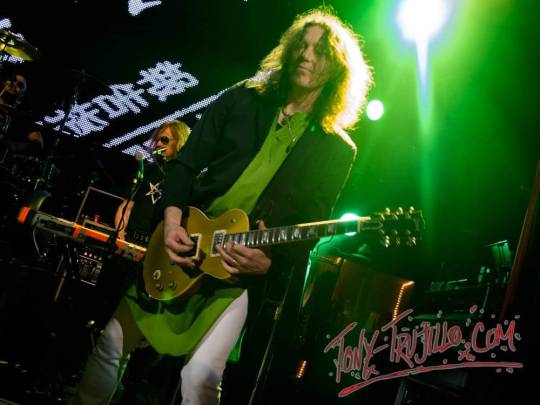
The guitarist had a surprise appearance on March 12 2012 at House of Blues venue in Los Angeles to perform his song, Better, and that was the last time he got up on stage with Guns.
That's it, most of the info and rumors here I've gotten from GnR forums: MyGnRforum.com, a-4-d.com and GnRevolution.com, so a big thank you to everyone.
#HAPPY BIRTHDAY ROBIN#robin finck#nine inch nails#guns n roses#trent reznor#richard fortus#axl rose#chinese democracy#I've got this incomplete for 2 entire years#it shouldn't have ended like this but I had to let it go one day
11 notes
·
View notes
Text

Model Rhea Durham and Stephen Dorff at the 1999 MTV Movie Awards
9 notes
·
View notes
Text

Morgan Spurlock
American film-maker best known for his acclaimed 2004 documentary Super Size Me
Few film-makers can say that their work has made a change to the real world, but Morgan Spurlock had a stronger claim than most. His 2004 documentary Super Size Me, an exposé of how the fast food industry was fuelling America’s obesity epidemic, appeared to have direct repercussions for the world’s largest fast food chain, McDonald’s.
Shortly before the film came out in May that year, the company introduced its Go Active! menu, which included salad items; six weeks after its release, the company abolished its supersize portions entirely.
McDonald’s claimed these menu changes were a coincidence. But the director, who has died aged 53 of complications from cancer, struck a timely blow at the business when awareness about fast food’s corrosive role in public health was on the rise.
Super Size Me’s high-concept premise – eating three McDonald’s meals for 30 days straight – was key to conveying Spurlock’s message. With the director gaining 11kg, plumping out his body fat from 11% to 18% and inflicting heart palpitations, impotence and depression on himself, his gonzo approach put him at the forefront of the early noughties boom in cinematic documentaries instigated by Michael Moore. “There’s real power in a documentary,”Spurlock later said.
Doubts later emerged about Spurlock’s experiment in bodily attrition, after he refused to release his diet logs from the period; and then when it later emerged that he was an alcoholic who had also imbibed during the shoot.
An inveterate attention-seeker and twinkly-eyed showman, he was not going to let these details affect either the purity of Super Size Me’s marketing line, or his emerging career as a documentary star; a budding Moore for the Jackass generation. He would consistently target totems of modern capitalism and consumerism, though none of his subsequent works had the same kind of influence as his 2004 lightning-bottler.
Spurlock was born in Parkersburg, West Virginia, and grew up in Beckley in the Methodist household of his auto-repair shop-owning father Ben and mother Phyllis, an English teacher and high-school counsellor. Though his parents later divorced, he credited his mother in particular with instilling in him a sense of activism: “She was one of those people who speak up when she didn’t agree with things. She was a collector of people too: if you had the ability to help people, you should,” he told the International Documentary Association.
A childhood fan of British humour such as Fawlty Towers and Monty Python, he was already exercising his entertainer’s streak doing “funny walks” around the house aged six or seven.
Rejected five times by University of Southern California’s film school, he graduated from the New York University Tisch School of the Arts in 1993. “I wanted to be Spielberg. I wanted to write and direct scripted movies,” Spurlock told Interview magazine. He originally showed promise in this direction, winning an award for his stage play The Phoenix at the New York international fringe festival in 1999.
After stints as a personal assistant on Woody Allen’s Bullets Over Broadway and Luc Besson’s Leon (both 1994), Spurlock first stepped in front of camera as a promotional spokesman for Sony Electronics. But his breakthrough came though hitching himself to the reality TV bandwagon with the self-created internet webcast, and, later (in 2002), MTV show, I Bet You Will. As one of the presenting team, Spurlock goaded members of the public into humiliating themselves for money – with stunts such as being “wedgied” or eating a worm burrito.
Super Size Me grossed $22m on a $65,000 budget, making it one of the most profitable documentaries of all time. Spurlock believed his body never fully recovered – though he lost the weight thanks to a special diet concocted by his then girlfriend, the vegan chef Alex Jamieson (the pair married and had a son, Laken, in 2006, before divorcing in 2011; Spurlock had been previously married to Priscilla Somer between 1996 and 2003).
He also later expressed doubts about the longer-term impact of Super Size Me on fast food corporations, later reflecting: “People say to me, ‘So has the food gotten healthier?’ And I say, ‘Well, the marketing sure has.’”
Spurlock could not skewer the zeitgeist again to create a second “doc-buster”, despite tilting at big-hitter topics such as terrorism (in 2008’s Where in the World is Osama Bin Laden?) and product-placement and advertising (POM Wonderful Presents: the Greatest Movie Ever Sold in 2011). With his trademark handlebar moustache, he settled into a reliably affable front-of-camera presence nosing around socio-cultural issues and foibles – sometimes fatuously.
In total, he directed and produced nearly 70 films and series, including a One Direction hagiography in 2013 and a Super Size Me sequel in 2017. But he retained keen business sense and marketing nous throughout this prolific output. “He taught us that we have to be chief executive artists,” his fellow documentary-maker Ondi Timoner told Variety.
Towards the end of Spurlock’s life, his career was on hold after he confessed in a 2017 blogpost to sexually abusive behaviour, including an allegation of rape while at college and paying off a production assistant he had harassed. “I have been unfaithful to every wife and girlfriend I have ever had,” he also wrote, explaining he had been sexually abused in his youth. He divulged all this possibly pre-emptively in anticipation of future accusations in the up swell of the #MeToo movement.
Making himself the focus of the story was true to his modus operandi, and his professed desire for self-improvement could indeed have made a fascinating documentary.
But the mea culpa proved an effective self-cancellation, with him resigning from the production company, Warrior Poets, he had founded in 2004 and being sued by Turner Entertainment Networks for an aborted project.
He divorced his third wife, the producer Sara Bernstein – with whom he had a second son – in 2024. His final documentary credit was for a mockumentary creating a fake history around the classic 1992 Simpsons episode Homer at the Bat.
Spurlock is survived by his children, Laken and Kallen, by his parents and his brothers, Craig and Barry.
🔔 Morgan Spurlock, director and producer, born 7 November 1970; died 23 May 2024
Daily inspiration. Discover more photos at Just for Books…?
12 notes
·
View notes
Text

Información
Nacimiento: 4 de junio de 1975 (edad 49 años), Cedars Sinai, Los Ángeles, California, Estados Unidos
Hijos: Shiloh Jolie, Knox Leon Jolie-Pitt, Vivienne Marcheline Jolie-Pitt, Zahara Jolie-Pitt · Ver más
Cónyuge: Brad Pitt (m. 2014–2019), Billy Bob Thornton (m. 2000–2003), Jonny Lee Miller (m. 1996–1999)
Hermanos: James Haven
Padres: Jon Voight, Marcheline Bertrand
Premios: Premio Óscar a la Mejor Actriz de Reparto, MTV Movie Award a la Mejor Pelea · Ver más
3 notes
·
View notes
Text

Catherine Zeta-Jones at MTV Movie Awards (1999)
19 notes
·
View notes
Text








SuperTeen, Summer 1999.
#digital collage#superteen#teen magazine#1999#1990s#lfo#lyte funky ones#*nsync#nsync#nick carter#joey mcintyre#98 degrees#aaron carter#backstreet boys#mandy moore#lip smackers#mtv movie awards
3 notes
·
View notes
Text





Nació el 9 de junio de 1963, en Owensboro, Kentucky, Estados Unidos, John Christopher Depp II (Johnny Depp), actor, productor, pintor, guionista y músico. Nominado en tres ocasiones al Premio Óscar. London Film Critics Circle Award for Actor of the Year 1995. Premio César Honorífico 1999. Premio Sindicato de Actor Mejor Actor 2004. Premio Empire mejor actor 2004 y 2006. Premio Globo de Oro Mejor Actor Comedia o Musical 2008. MTV Movie Award Mejor Villano 2008. Leyenda Disney 2015. Premio People's Choice al Ícono de Película Favorito 2017. Festival de Cine de San Sebastián Premio Donostia 2021. Estrella en el Paseo de la Fama de Hollywood.
6 notes
·
View notes